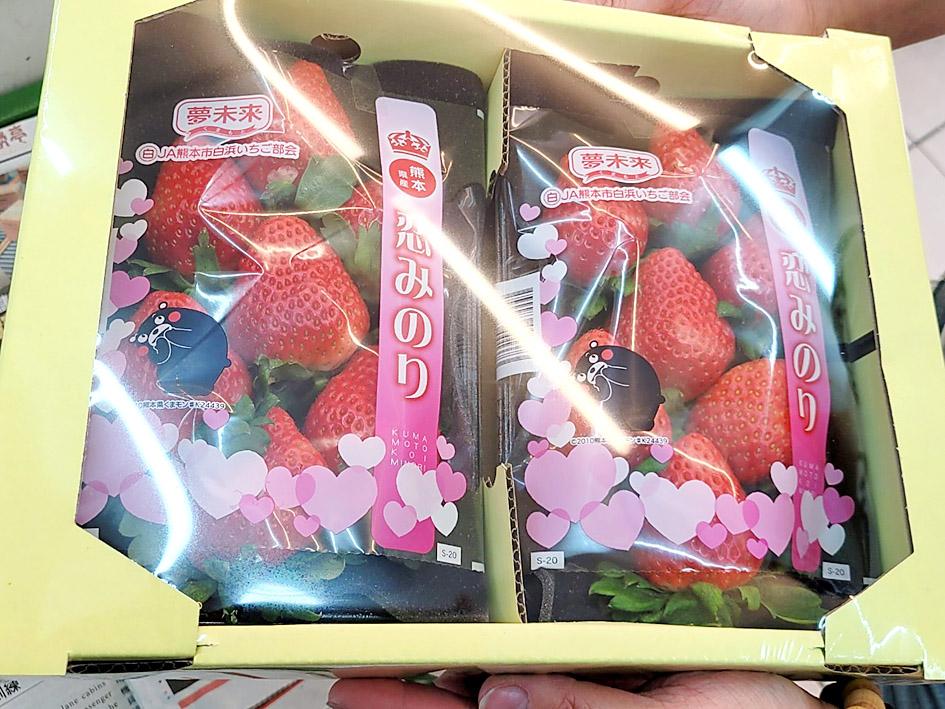The Taipei Department of Health yesterday said that its latest pesticide residue testing on fresh fruit and vegetables resulted in a failure rate of 23.1 percent, with the failed items including strawberries and kumquats imported from Japan.
The department said the 52 tested items — 43 domestic and nine imported — tested last month were randomly sourced from markets, retailers, restaurants and beverage stores.
The results showed that 12 items failed the pesticide residue testing, including seven domestic items (a failure rate of 16.3 percent) and five imported items (a failure rate of 55.6 percent), it said.

Photo courtesy of Taipei Department of Health via CNA
The failed items included three types of strawberries, two types of kumquat, two types of Chinese kale, two types of Chinese cabbages, two types of garland chrysanthemum and a chili pepper.
Among the failed items, a garland chrysanthemum used at a hotpot restaurant was found to have three types of pesticide exceeding the maximum residue limit (MRL) — boscalid at 14.9 parts per million (ppm) (MRL at 4ppm), difenoconazole at 3.5ppm (MRL at 1ppm) and dimethomorph at 4.9ppm (MRL at 2.5ppm).
The five imported items are two types of kumquat and three types of strawberries, all imported from Japan by the same importer in New Taipei City, department data showed.
The imported strawberries were each found to have one type of pesticide exceeding the MRL, the imported kumquats were each found to have a type of pesticide that has been banned, while one was also found to have a pesticide exceeding its MRL.
Food and Drug Administration section head Chen Yi-ting (陳怡婷) said the high failure rate of imported items could be because the department focused on selecting food items with a higher risk of containing pesticide residues, and the high rate of imported strawberries from Japan detected with high levels of pesticide residue could be a seasonal issue.
She urged people to wash fresh fruit and vegetables thoroughly before eating, to prevent possible intake of pesticide residues.
Separately, the Food and Drug Administration yesterday said that 15 batches of strawberries imported from Japan in the past three months were found with excessive pesticide residues at border inspections, so the administration on Monday launched a batch-by-batch inspection mechanism for all imported strawberries from Japan.
Additional reporting by CNA

Nipah virus infection is to be officially listed as a category 5 notifiable infectious disease in Taiwan in March, while clinical treatment guidelines are being formulated, the Centers for Disease Control (CDC) said yesterday. With Nipah infections being reported in other countries and considering its relatively high fatality rate, the centers on Jan. 16 announced that it would be listed as a notifiable infectious disease to bolster the nation’s systematic early warning system and increase public awareness, the CDC said. Bangladesh reported four fatal cases last year in separate districts, with three linked to raw date palm sap consumption, CDC Epidemic Intelligence

The manufacture of the remaining 28 M1A2T Abrams tanks Taiwan purchased from the US has recently been completed, and they are expected to be delivered within the next one to two months, a source said yesterday. The Ministry of National Defense is arranging cargo ships to transport the tanks to Taiwan as soon as possible, said the source, who is familiar with the matter. The estimated arrival time ranges from late this month to early next month, the source said. The 28 Abrams tanks make up the third and final batch of a total of 108 tanks, valued at about NT$40.5 billion

Two Taiwanese prosecutors were questioned by Chinese security personnel at their hotel during a trip to China’s Henan Province this month, the Mainland Affairs Council (MAC) said yesterday. The officers had personal information on the prosecutors, including “when they were assigned to their posts, their work locations and job titles,” MAC Deputy Minister and spokesman Liang Wen-chieh (梁文傑) said. On top of asking about their agencies and positions, the officers also questioned the prosecutors about the Cross-Strait Joint Crime-Fighting and Judicial Mutual Assistance Agreement, a pact that serves as the framework for Taiwan-China cooperation on combating crime and providing judicial assistance, Liang

A group from the Taiwanese Designers in Australia association yesterday represented Taiwan at the Midsumma Pride March in Melbourne. The march, held in the St. Kilda suburb, is the city’s largest LGBTQIA+ parade and the flagship event of the annual Midsumma Festival. It attracted more than 45,000 spectators who supported the 400 groups and 10,000 marchers that participated this year, the association said. Taiwanese Designers said they organized a team to march for Taiwan this year, joining politicians, government agencies, professionals and community organizations in showing support for LGBTQIA+ people and diverse communities. As the first country in Asia to legalize same-sex